The Intel Xeon W-3175X Review: 28 Unlocked Cores, $2999
by Ian Cutress on January 30, 2019 9:00 AM ESTCPU Performance: Office Tests
The Office test suite is designed to focus around more industry standard tests that focus on office workflows, system meetings, some synthetics, but we also bundle compiler performance in with this section. For users that have to evaluate hardware in general, these are usually the benchmarks that most consider.
All of our benchmark results can also be found in our benchmark engine, Bench.
For our graphs, some of them have two values: a regular value in orange, and one in red called 'Intel Spec'. ASUS offers the option to 'open up' the power and current limits of the chip, so the CPU is still running at the same frequency but is not throttled. Despite Intel saying that they recommend 'Intel Spec', the system they sent to us to test was actually set up with the power limits opened up, and the results they provided for us to compare to internally also correlated with that setting. As a result, we're providing both sets results for our CPU tests.
PCMark 10: Industry Standard System Profiler
Futuremark, now known as UL, has developed benchmarks that have become industry standards for around two decades. The latest complete system test suite is PCMark 10, upgrading over PCMark 8 with updated tests and more OpenCL invested into use cases such as video streaming.
PCMark splits its scores into about 14 different areas, including application startup, web, spreadsheets, photo editing, rendering, video conferencing, and physics. We post all of these numbers in our benchmark database, Bench, however the key metric for the review is the overall score.
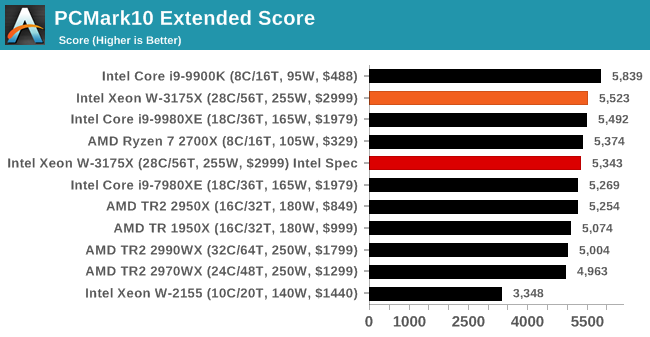
.
Chromium Compile: Windows VC++ Compile of Chrome 56
A large number of AnandTech readers are software engineers, looking at how the hardware they use performs. While compiling a Linux kernel is ‘standard’ for the reviewers who often compile, our test is a little more varied – we are using the windows instructions to compile Chrome, specifically a Chrome 56 build from March 2017, as that was when we built the test. Google quite handily gives instructions on how to compile with Windows, along with a 400k file download for the repo.
In our test, using Google’s instructions, we use the MSVC compiler and ninja developer tools to manage the compile. As you may expect, the benchmark is variably threaded, with a mix of DRAM requirements that benefit from faster caches. Data procured in our test is the time taken for the compile, which we convert into compiles per day.
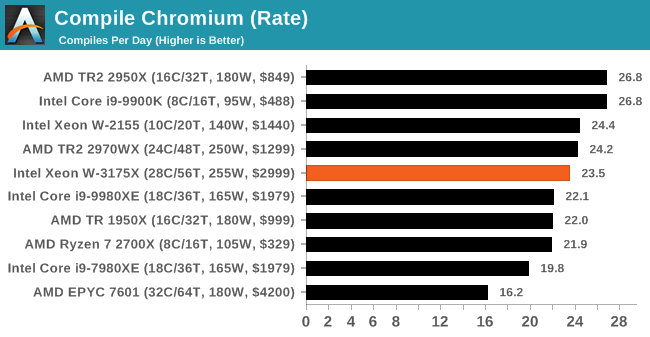
.
3DMark Physics: In-Game Physics Compute
Alongside PCMark is 3DMark, Futuremark’s (UL’s) gaming test suite. Each gaming tests consists of one or two GPU heavy scenes, along with a physics test that is indicative of when the test was written and the platform it is aimed at. The main overriding tests, in order of complexity, are Ice Storm, Cloud Gate, Sky Diver, Fire Strike, and Time Spy.
Some of the subtests offer variants, such as Ice Storm Unlimited, which is aimed at mobile platforms with an off-screen rendering, or Fire Strike Ultra which is aimed at high-end 4K systems with lots of the added features turned on. Time Spy also currently has an AVX-512 mode (which we may be using in the future).
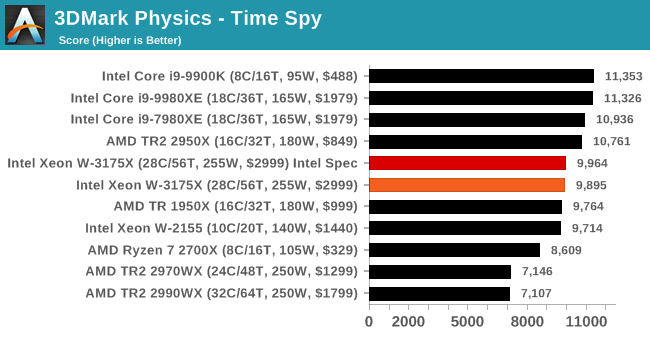
.
GeekBench4: Synthetics
A common tool for cross-platform testing between mobile, PC, and Mac, GeekBench 4 is an ultimate exercise in synthetic testing across a range of algorithms looking for peak throughput. Tests include encryption, compression, fast Fourier transform, memory operations, n-body physics, matrix operations, histogram manipulation, and HTML parsing.
I’m including this test due to popular demand, although the results do come across as overly synthetic, and a lot of users often put a lot of weight behind the test due to the fact that it is compiled across different platforms (although with different compilers).
We record the main subtest scores (Crypto, Integer, Floating Point, Memory) in our benchmark database, but for the review we post the overall single and multi-threaded results.
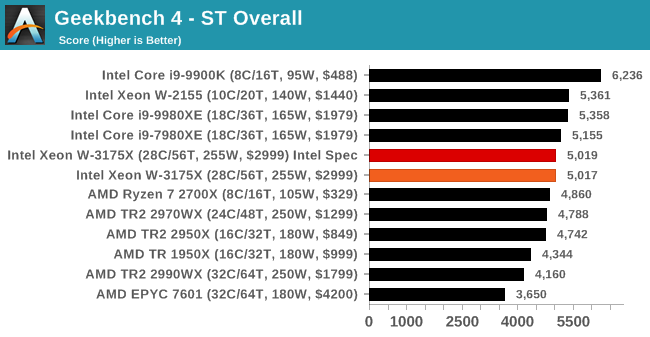
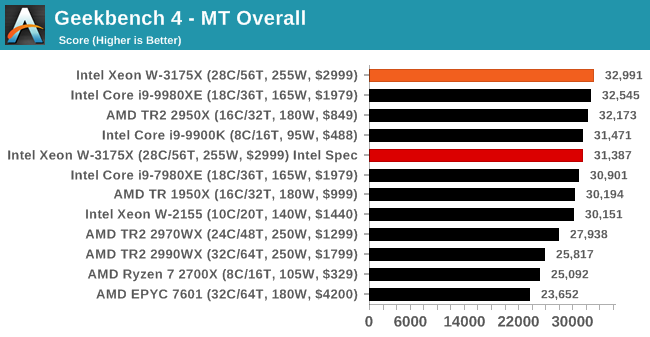










136 Comments
View All Comments
Yorgos - Wednesday, January 30, 2019 - link
it's not only program dependent, it's also scheduler dependent.It is found that the windows scheduler doesn't treat TR very well and throttles it down.(ref. L1T)
MattZN - Wednesday, January 30, 2019 - link
Yup, in a nutshell. When Microsoft finally fixes that scheduler issue all of these sites will have to rerun their benchmarks. While it won't run away on performance, the results will start to look more like they should given the HW capabilities. Not a problem for me with Linux but its kinda amusing that Windows users are so beholden to bugs like these and even the professional reviewers get lost when there isn't a convenient UI button that explains what is going on.-Matt
mapesdhs - Saturday, February 2, 2019 - link
Is that the same issue as the one referring to running on core zero? I watched a video about it recently but I can't recall if it was L1T or elsewhere.jospoortvliet - Sunday, February 3, 2019 - link
it is that issue yes. blocking use of core is a work-around that kind'a works.jospoortvliet - Sunday, February 3, 2019 - link
(in some workloads, not all)Coolmike980 - Monday, February 4, 2019 - link
So here's my thing: Why can't we have good benchmarks? Nothing here on Linux, and nothing in a VM. I'd be willing to be good money I could take a 2990, run Linux, run 5 VM's of 6 cores each, run these benchmarks (the non-gpu dependent ones), and collectively beat the pants off of this CPU under any condition you want to run it. Also, this Civ 6 thing - the only benchmark that would be of any value would be the CPU one, and they've been claiming to want to make this work for 2 years now. Either get it working, or drop it altogether. Rant over. Thanks.FlanK3r - Wednesday, January 30, 2019 - link
where is CinebenchR15 results? In testing methology is it, but in results I can not find it :)MattsMechanicalSSI - Wednesday, January 30, 2019 - link
der8auer did a delid video, and a number of CB runs. https://www.youtube.com/watch?v=aD9B-uu8At8 Also, Steve at GN has had a good look at it. https://www.youtube.com/watch?v=N29jTOjBZrwMattZN - Wednesday, January 30, 2019 - link
@MattsMechanicalSSI Yup... both are very telling.I give the 3175X a pass on DDR connectivity (from the DerBauer video) since he's constantly having to socket and unsocket the chip, but I agree with him that there should be a carrier for a chip that large. Depending on the user to guess the proper pressure is a bad idea.
But, particularly the GN review around 16:00 or so where we see the 3175X pulling 672W at the wall (OC) for a tiny improvement in time over the 2990WX. Both AMD and Intel goose these CPUs, even at stock, but the Intel numbers are horrendous. They aren't even trying to keep wattages under control.
The game tests are more likely an issue with the windows scheduler (ala Wendel's work). And the fact that nobody in their right mind runs games on these CPUs.
The Xeon is certainly a faster CPU, but the price and the wattage cost kinda make it a non-starter. There's really no point to it, not even for professional work. Steve (GN) kinda thinks that there might be a use-case with Premier but... I don't really. At least not for the ~5 months or so before we get the next node on AMD (and ~11 months for Intel).
-Matt
mapesdhs - Saturday, February 2, 2019 - link
Cinebench is badly broken at this level of cores, it's not scaling properly anymore. See:https://www.servethehome.com/cinebench-r15-is-now-...